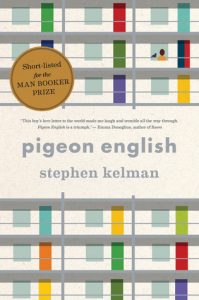Stephen Kelman: Pigeon English (October 2023)
 Partly inspired by the stabbing of Damilola Taylor, Pigeon English is a story about an 11 year old Ghanaian boy, Harri, who has recently moved to a grim council estate with his mother and older sister. His father, grandmother and baby sister have remained in Ghana and his mother, a midwife, is in debt to the violent criminal who enabled their relocation. The novel is told from the perspective of Harri and uses Ghanaian expressions and the typical slang of young people.
Partly inspired by the stabbing of Damilola Taylor, Pigeon English is a story about an 11 year old Ghanaian boy, Harri, who has recently moved to a grim council estate with his mother and older sister. His father, grandmother and baby sister have remained in Ghana and his mother, a midwife, is in debt to the violent criminal who enabled their relocation. The novel is told from the perspective of Harri and uses Ghanaian expressions and the typical slang of young people.
He is struggling to make sense of his completely alien environment and when a schoolfriend is stabbed he invents a game with another boy, based on American TV cop shows, of trying to identify the killer. This puts him in mortal danger from the gang who wield enormous power over the children on the estate.
Harri and his sister are drawn into the gang culture against their will, through fear and and partly because of their need to belong and fit in.
There seems to be no escape from violence, cruelty and bullying for Harri’s family.
Stephen Kelman was brought up in Luton on the notorious Marsh Farm Estate and teaches martial arts to underprivileged children but, even so, there were some strong misgivings about a white man in his forties writing with the voice of a young Ghanaian boy. Other authors have written from the viewpoint of a child, To Kill a Mockingbird particularly comes to mind, but some of us thought that this writer had not carried it off so successfully. Others found the book powerful, horrifying, sympathetic and moving, with realistic and engaging characters. The writing style with its unfamiliar vocabulary was off putting to a couple of our readers but others got the hang of it after a few pages and persevered.
The metaphor of the pigeon confused us.
Was it a guardian angel, a wise onlooker, a character as despised as the immigrants or did he represent nature and wildlife so missing in Harri’s life?
Pigeon English is now on the GCSE syllabus and tackles important social issues.
Our mixed response to this month’s book resulted in a mark of 2/5
